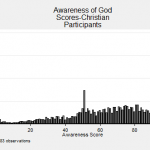I would like to pose some questions about emotions in church. What should be the emotions expressed from the pew? From the pulpit? How might the church’s emotion-rules hurt it’s people and hinder its mission?
Here are my thoughts:
In most churches there are clearly defined implicit rules about which few emotions are appropriate to express.
For the church goer, the modal expression should be polite interest, and the face should show either a neutral expression or, even better, a smile. It’s okay to sometimes laugh or look troubled when prompted to from the person leading the service. Attending a church service in the U.S. often proves to be a cognitively-rich but emotionally-passive experience, and I wonder if these services would hold more appeal, and have a greater impact, if the congregation was more emotionally involved in the service. Black churches, with typically more active participation from the pew in all parts of the service, seem to get this more right than white churches.
For the pastor, the rules of emotion are even more strict. Before and after the service itself, when greeting people or talking with them, pastors are limited to showing friendliness and interest… sort of like what stewardesses are supposed to do. During the service they can remain in this mode, though at appropriate times can show emotions such as distress (when talking about someone having a difficult time), enthusiasm (when exhorting the church), maybe light forms of anger (when righteously based).
Compare this with the emotions expressed by Jesus in his ministry. He laughed, he raged, he wept–one could not accuse him of being emotionally stunted.
This very-limited, narrowly defined range of emotions for pastors causes various problems.
1) A unchurched visitor, not used to these emotional rules, might experience the emotional environment as “fake” and have a correspondingly low opinion of the church itself.
2) The emotional-restraints placed on a pastor can easily carry on over into other parts of their lives such that any time the pastor is in public (and maybe even in public) they have to be quite limited in the emotions they display, which would seem to be harmful to them at various levels.
3) These emotional limits could easily cultivate an inauthentic church environment. If we’re not expressing what we really feel, then we should probably not say what we’re really thinking and so one such the church, and its people, become less authentic.
Thoughts?











